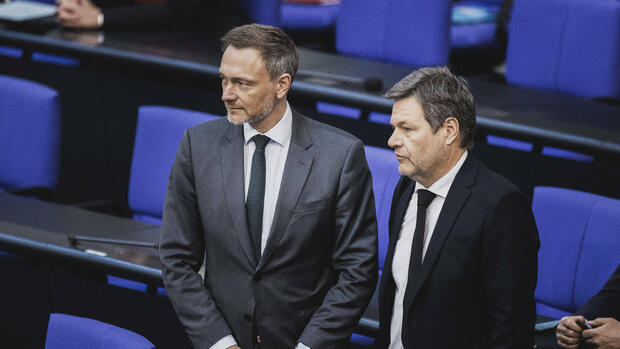The draft for the heating law already approved by the cabinet stipulates that new heating systems must be operated with at least 65 percent renewable energy from 2024.
(Photo: IMAGO/photothek)
Berlin The coalition partners are groping their way towards a solution in the dispute over the Building Energy Act (GEG). “We had a constructive and technically oriented discussion,” said the FDP energy expert Konrad Stockmeier on Wednesday the Handelsblatt. The evening before, Federal Economics Minister Robert Habeck (Greens) met with the GEG reporters from the three traffic light groups for a two-hour exchange.
Timon Gremmels, reporter for the SPD parliamentary group for the GEG, spoke of a “good atmosphere” that made everyone optimistic. Ingrid Nestle, energy policy spokeswoman for the Greens in the Bundestag, told the Handelsblatt that they were ready for parliamentary negotiations. “People deserve planning security,” she added.
According to participants, the core of the discussions between Habeck and the representatives of the parliamentary groups was the 77-point list of questions that the FDP had created for the draft law. The talks are now being continued at the level of the parliamentary group deputy leaders. The aim of the traffic light coalition is to pass the law before the summer break, despite all the differences of opinion.
The GEG has been controversial among the three coalition partners for weeks. The dispute between the Greens and the FDP is particularly large. The Liberals were convinced that the original draft of the GEG was too rigid. The FDP wants openness to technology, longer transition periods and less coercion.
The draft for the heating law already approved by the cabinet stipulates that new heating systems must be operated with at least 65 percent renewable energy from 2024. In fact, this is accompanied by a ban on new oil and gas heating systems. Existing heating systems that have not exceeded a certain minimum age may continue to be operated. The conversion to new heating systems should be promoted.
Continued concerns in Lindner’s ministry
Federal Finance Minister Christian Lindner (FDP) had already approved the law a few weeks ago, but made a statement in the minutes that changes to the law still had to be made in the parliamentary process. Only on Tuesday last week did the FDP parliamentary group ensure that the GEG draft was not submitted to the Bundestag as originally planned.
In fact, the traffic light plans are accompanied by a ban on new oil and gas heating systems.
(Photo: IMAGO/Manngold)
In the meantime, some FDP politicians have increasingly distanced themselves from the draft of the GEG. They advocate ending the “small-scale climate protection policy and instead continuing the success story of emissions trading”.
Economics Minister Habeck announced changes last week. A staggering that gives owners of existing buildings more time is conceivable, the Greens politician said. “We could start switching for new buildings from January 1, 2024,” explained Habeck.
With the existing buildings, he would want to accommodate the desire for more time. Here the challenges are greater. “And in view of the concerns about the lack of craftsmen and delivery bottlenecks, a little more time is also a help,” said Habeck.
>> Read here: Follow all current developments in the energy crisis in the news blog
Meanwhile, the dispute over the law for municipal heat planning associated with the Building Energy Act continues. It was agreed that the draft would be sent to countries and associations for consultation, sources in the Ministry of Finance said on Wednesday. But: “A substantive approval is expressly not associated with this step.” In the ministry of FDP leader Lindner, there are still technical concerns.
The Heat Planning Act obliges the federal states and local authorities: In the coming years, they should present concrete plans on how they want to convert their heating infrastructure to be climate-neutral. For large cities, these heat plans should be ready by the end of 2026, smaller cities should have two years longer.
>> Read here: Heat plans should cover every house
The plans of the municipalities are intended to provide important orientation for citizens, because they will find out whether there is a prospect of connecting their house to a heating network soon – or whether they should convert their heating system to a heat pump in the foreseeable future.
More: Plumbers refuse orders to install gas boilers
